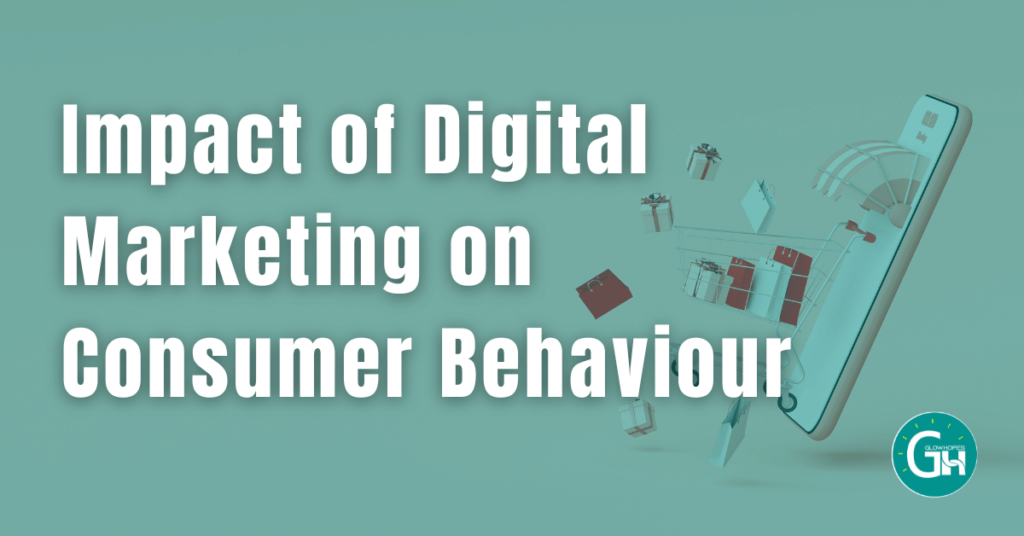Good day! Have you ever questioned how the advertisements that appear in your feeds on social media appear to be tailored to your interests? All of this is possible because of the effectiveness of digital marketing! The impact of digital marketing on consumer behaviour cannot be overstated. The methods used by businesses when marketing their services and products are also changing as technology advances. Any effective marketing plan now includes digital marketing as a necessary component, and it is impossible to ignore how this has an impact on customer behaviour.
We’ll examine the intriguing field of digital industry from the evolution of digital marketing to the latest case studies, we will provide a comprehensive overview of the impact of digital marketing on consumer behaviour in detail with the latest trends and insights as well as how it influences how we shop, engage with companies, and make choices about what to buy. So grab a coffee, settle down, and let’s get started!
The Evolution of Digital Marketing
The evolution of digital marketing has had a significant impact on consumer behaviour, as businesses strive to keep up with the constantly changing online landscape. With the increasing trends of the internet, digital marketing has evolved to include multiple strategies such as social media marketing, email marketing, content marketing, search engine optimization and more, all targeted at reaching consumers on the digital platforms where they spend most of their time online.
The shift from traditional marketing to digital marketing
Consumers are increasingly using the internet to study goods and services before making purchases in today’s fast-paced internet-based society. Traditional marketing strategies are gradually being replaced by fresher options as technological developments continue. The growth of digital marketing has completely changed how companies communicate with their customers. More connected than ever, consumers are always looking for new products and services online. As a result of this, traditional marketing strategies have given way to how digital marketing affects consumer behaviour.
Businesses may target a larger audience and make their marketing more unique by using digital marketing. This significantly impacts customers behavior because people are more inclined to interact with companies that are actively online.
The different types of digital channels measuring digital marketing’s impact on consumer behaviour
Impact of social media on consumer behaviour in digital marketing:
With billions of users worldwide, social media has proven itself as one of the most effective digital marketing platforms in recent years. Businesses have a direct channel of contact with their target audience through platforms like Facebook, Instagram, and Twitter, enabling them to connect with potential customers in real-time. Social media marketing is the process of creating and distributing content on various networks to increase awareness of a company, traffic, and lead generation. The impact of digital marketing on consumer behaviour via social media is increasingly rising everyday with creating effective social media marketing campaigns.
The influence of content marketing on customer behaviour
Any effective digital marketing plan must include content marketing. In order to attract in and keep the attention of a target audience and ultimately increase conversions, it involves creating and delivering valuable content. Blog entries, videos, infographics, and social media postings are just a few of the different formats that content may take. The need to produce excellent, interesting content has never been greater because of the growth of digital platforms and the expanding amount of information available to customers. The influence of content marketing on customer behaviour offers advice for developing successful content marketing initiatives.
Artificial intelligence and consumer behaviour in digital marketing
Artificial intelligence has altered how businesses understand consumer behaviour and may support the development of more efficient and focused marketing campaigns. Predictive analytics (AI) integration in digital marketing has improved our understanding of customer behaviour in ways that have never been possible before. This is especially true with chatbots like chatGPT. Large volumes of data may be analysed by AI to develop individualised and successful marketing strategies that respond to distinct consumer tastes, increasing the conversion rates and strengthening client loyalty. Additionally, chatbots enabled by AI may also offer quick customer support, boosting the user experience and influencing consumer behaviour.
Effect of Video Marketing on Consumer Behavior in Digital Marketing
A crucial tool for companies trying to engage with their customers is video marketing. Video marketing is a powerful tool for grabbing attention and establishing connections with customers who prefer watching to reading. The popularity of social media sites , including YouTube, Instagram, and Facebook, has increased video usage in digital marketing. Given that videos are more remembered and have the power to stir up powerful emotions, they have a substantial impact on customer behaviour. This may then result in more brand recognition, greater engagement, and eventually, greater revenue.
The Impact of E Commerce on Consumer Purchasing Habits
The world of ecommerce has significantly impacted by digital marketing on consumers behaviour as more and more people opt to purchase online. Ecommerce sites like Amazon and eBay have revolutionized the way users buy and sell items. Digital marketing playing a vital part in driving quality customers to these platforms. Ecommerce firms rely on digital marketing to attract and engage their target audience. They use anything from targeted ads to customised email campaigns. The most recent trends and insights in this field takes a deeper understanding at how digital marketing affects ecommerce.
The impact of sales promotion on consumer buying behaviour
While we examine more closely at how digital marketing has impacted E commerce, it has entirely altered the way businesses compete themselves in the global market. E-commerce and online ads allow immediate access to a global audience, thanks to the development of e-commerce and digital distribution channels via running online ads. Trade has grown more profitable with the advancement of digital marketing methods. This includes search engine optimization (SEO), pay per click (PPC) marketing, and email marketing, etc.
5 Online marketing influence of the current business landscape
Individualization :
A very important part of digital marketing that impacts customer behaviour is personalization. Businesses may improve the experience for their target audience by customising marketing messages to each and every customer. As consumers feel appreciated and understood, personalised marketing could boost conversion rates and build client loyalty. Customised digital marketing may promote customer retention, increase conversion rates, and has a substantial influence on consumer behaviour.
Cognitive processes :
To be successful in advertising, digital marketing and consumer purchase decisions are to be highlighted. Brands need to understand consumer psychology. Businesses may establish a stronger connection with their audience and impact behaviour by appealing to emotions. Marketers may utilise strategies like scarcity, urgency, and social proof to persuade consumer choices and drive sales. Effective digital marketing requires an understanding methods of making choices which may be used to influence consumer decision-making and drive behaviour change.
Support and Satisfaction :
In order to have an effect on consumer behaviour, exceptional customer service is essential in digital marketing. It may foster client loyalty, trust, and favourable suggestions from others. In digital marketing, excellent customer service is extremely important. Customers anticipate immediate and effective solutions to their questions and concerns, and failing to deliver on these promises may result in unfavourable reviews and lost sales. Businesses can cultivate trust, client loyalty, and positive referrals from satisfied customers by placing customer service first.
Community-building :
Building trust and participation with customers is a must in digital marketing. Businesses could encourage a sense of belonging and loyalty by forming deeper connections with their customers. They can be engaged through experiences created using strategies like personalised advertising and storytelling. You can design memorable experiences which might impact consumer behaviour. Building relationships with customers is like a prerequisite for digital marketing since it may lead to meaningful interactions between consumers which guide their behaviour.

Why Do Businesses Need to Understand the Impact of Digital Marketing on Consumer Behaviour?
The below four points are the major reasons for consumers effect on digital marketing where brands can understand the psychology and leverage them for their business growth.
Impulsive Buying:
Through compelling messaging, targeted promotions, and scarcity strategies that might affect consumer decision-making, digital marketing has the potential to generate impulsive purchase behaviour in customers. Digital marketing strategies like customised promos, time-limited deals, and targeted adverts might cause irrational buying behaviour. Digital marketers may take advantage of impulsive buying behavior to boost sales and income. Spontaneous buying affects customer behavior by creating a sense of urgency and scarcity. However, it’s crucial to counterbalance these strategies with moral marketing techniques that put long-term business relationships and consumer demands first.
Instant Gratification:
Today’s consumers have high demands for digital experiences, such as quick loading times, individualised content, and smooth customer service. Digital marketers must deliver quick and effective solutions to fulfil their requirements considering they also have poor patience and small attention spans. Digital marketers can alter consumer habits, create trust, and encourage enduring loyalty by providing extraordinary customer experiences. Consumers have high expectations and minimal patience in the fast-paced digital age of today, so digital marketers must create exceptional customer experiences that are quick, efficient, and convenient to meet those needs and expectations.
Attention Span:
Consumers are overwhelmed with information in the digital phase, and their attention span is dropping rapidly. Digital marketers need to provide content that is both attention-grabbing and engaging in order to hold readers’ attention and keep them hooked. Interactive material, infographics, and short videos are powerful tools for shaping customer behaviour. Producing captivating content that connects with the target audience and changes their behaviour by putting quality above quantity is the top priority. Marketers must produce interesting and attention-grabbing material that may rapidly and successfully attract client’s interest. This is necessary to modify their behaviour and raise conversion rates due to the consumers’ declining sustained interest.
Testimonials :
Online reviews have a big impact on how people behave since so many people use them to navigate their purchases. Positive reviews may boost credibility and trust, while bad reviews can damage a company’s reputation. Businesses may use the power of social proof on multiple digital platforms to promote sales and improve customer satisfaction by improving and responding to reviews. The influence of social proof on consumer behaviour is incredibly important since so many customers rely on it to guide their purchase decisions.
3 Case Studies on the Impact of Digital Marketing on Consumer Behaviour
The impact of digital marketing on the success of Airbnb
The well-known home-sharing platform Airbnb has long been a pioneer in the tourism sector. Its internet marketing approach is largely responsible for its success. In order to engage with its target audience and establish a feeling of community, the firm actively use social media. Through intriguing content and user-generated postings, Airbnb has developed a devoted following of tourists ready to utilise the site to book accommodations because they have trust in the company. The success of Airbnb is also greatly attributed to its customised marketing strategy. The business uses data to develop tailored marketing campaigns that speak to particular passenger demographics. For instance, if a customer often makes reservations for romantic trips, Airbnb would modify its marketing messaging to highlight romantic locales and activities. The buying choices made by consumers are significantly impacted by this since they are more inclined to interact with information that speaks to them personally.
To improve the user experience, Airbnb has also adopted cutting-edge technology like virtual reality and augmented reality. The business provides customers a more realistic and immersive image of the rentals they’re interested in by leveraging these technologies. This has a big influence on consumer behaviour building confidence and trust among customers utilising the site to book hotel-rooms.
How Coca-Cola’s digital marketing strategy has impacted its sales
One of the most well known and popular brands in the world is Coca-Cola, and its success may be partly credited to its use of digital marketing. The business has employed a range of digital marketing strategies to raise brand recognition and boost sales. Coca-Cola’s strategy mostly includes using social media as one of its primary components. This business is well known on social media sites where they regularly post interesting material that appeals to its target market.
Focusing on user-generated content is a key component of Coca-Cola’s digital marketing strategy. The business initiated campaigns to uplift customers to share photos and videos of themselves consuming Coca-Cola products. This significantly affects customer behaviour because it instils a sense of community and encourages users to engage with the brand on a more personal level.
Coca-Cola has also made use of cutting edge technology, including augmented reality, to build fun and interactive marketing campaigns. For instance, the business developed an augmented reality software that let users play a virtual game by scanning a Coca-Cola can. Because it produces more engagement and encourages consumers to connect with the brand for longer periods of time, this has an enormous impact of digital marketing on consumer behaviour.
The role of digital marketing in the success of Nike’s “Just Do It” campaign
Nike’s “Just Do It” campaign is one of the most iconic marketing campaigns of all time, and its success can be attributed, in part, to the company’s digital marketing strategy. The ad, which debuted in 1988, was created to inspire individuals to go after the goals they have and fulfil their ambitions. This message reached a wide audience and Nike’s brand recognition increased significantly as a result of its digital marketing approach.
Utilising social media was a key aspect of Nike’s digital marketing strategy. The company used social media channels including Facebook, Twitter, and Instagram, to post inspiring content that resonated with its audience. This has affected consumer behavior greatly as it promotes a feeling of community and motivates consumers to engage with the brand on a more personal level.
The brand expanded their “Just Do It” campaign by using influencer marketing. They paired athletes and celebrities who reflected the campaign’s agenda and encouraged them to share their stories on social media. Users were more willing to interact with content published by influencers they value as a result, which had a major impact on consumer behaviour.
Utilising technologies like augmented reality was a crucial part of Nike’s digital marketing strategy. The business created AR software for virtual shoe try-ons, upgrading online shopping and eliminating the need for physical store visits. Furthermore, the app offers customised recommendations based on user tastes, helping users in learning about new products while selecting them wisely.
How Does Digital Marketing Have Both Positive and Negative Effects on Consumer Behaviour?
The Negative Impact of Digital Marketing on Consumer Behaviour:
Although digital marketing offers a number of benefits and is now an essential element of many organisations’ marketing plans, it may also have a negative effect on consumer behaviour. The increase in consumer privacy concerns is one of the most serious negative effects. Businesses gather consumer data, and the consumers worry about its usage and lack of transparency. As a result, many users decide to limit how much personal information they disclose online, which might effect digital marketing campaigns.
The development of ad-blocking software has had negative impacts as well. Daily exposure to commercials has resulted in becoming accustomed among many consumers. They are in turn using ad-blocking software to get rid of intrusive ads. This can lead to a reduction in the effectiveness of digital marketing campaigns.
Moreover, information overload might result from digital marketing. The abundance of alternatives offered online often overwhelms customers, which frequently confuses them. Customers may choose to opt-out or quit the website entirely, which can be bad for businesses.
To minimize negative influence of data gathering, companies are supposed to be open, protect customer privacy, and produce quality content.
The Positive Impact of Digital Marketing on Consumer Behaviour:
Digital marketing is changing the way how businesses connect with potential customers in today’s world, resulting in various beneficial impacts on consumer behavior. The ability to tailor information and offers to particular customers based on their preferences and interests is one of the biggest advantages. As a result, the experience becomes more meaningful and relevant, which inturn enhances engagement and loyalty.
Additionally, digital marketing helps companies to reach a larger audience than they could with traditional advertising methods. Businesses can now effortlessly target specialised markets and certain demographics through the use of social media, email marketing, and other digital strategies.
The capacity to monitor and evaluate the success of marketing activities has an additional positive consequence. This allows businesses to adjust their strategies and optimise their campaigns for maximum impact, leading to better ROI.
Digital marketing also enables in-the-moment communication with customers, giving companies the chance to respond to comments and inquiries. Customers will have a more favourable personalised experience as a result, which will increase their happiness and loyalty. Businesses may have a beneficial influence on consumer behaviour by prioritising transparency, individualization, and engagement in their digital marketing strategy. This will enhance brand recognition and customer loyalty.
Conclusion:
To round it off, businesses have had a considerable impact of digital marketing on consumer behaviour in recent years. Technology advancements like AI bots are changing how companies communicate with their consumers, leading to constant changes. Businesses must stay on top of the most recent developments in digital marketing and partner with the best digital marketing agency if they want to succeed in this highly competitive field. By doing this, businesses can create effective marketing plans for their target audience in order to increase sales more quickly. I hope you learnt how much the impact is on consumers behaviour when it comes to digital marketing.




Thank you for the valuable information on the blog.
I am not an expert in blog writing, but I am reading your content slightly, increasing my confidence in how to give the information properly. Your presentation was also good, and I understood the information easily.
Your blog post was really enjoyable to read, and I appreciate the effort you put into creating such great content. Keep up the great work!